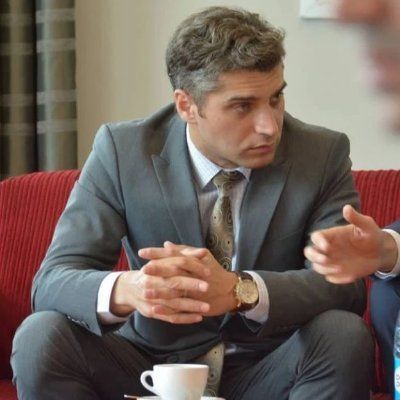Diplomacy of kinship in Iran-Azerbaijan relations amid regional realignments [ANALYSIS]
![Diplomacy of kinship in Iran-Azerbaijan relations amid regional realignments [ANALYSIS]](https://www.azernews.az/media/2025/04/30/baku_tehran_upscaled.png)
In the shifting landscape of Eurasian geopolitics, where historical rivalries and new strategic equations often collide, a quiet yet consequential recalibration is unfolding between two neighbors with a complex past: Azerbaijan and Iran.
At the heart of this diplomatic revival is a message laden with symbolism and intent. During a recent high-level meeting, the presidents of the two nations addressed each other as "dear brother"—a public display of warmth rarely seen in the recent history of bilateral ties. The language underscored not only a thaw in relations but a deliberate step toward a more structured and strategic partnership.
For Azerbaijan, whose foreign policy has long prioritized strong relations with neighboring powers, including its formal alliance with Turkiye and strategic partnership with Russia, reviving ties with Iran represents a pragmatic evolution. It also reflects the vision first articulated by Azerbaijan's National Leader, Heydar Aliyev, and now refined by his son, President Ilham Aliyev: a foreign policy anchored in balance, pragmatism, and respect for sovereignty.
The backdrop to this rapprochement is critical. In the aftermath of the 2020 Garabagh war, regional alignments have shifted. Azerbaijan emerged more confident, its territorial integrity largely restored. In turn, Baku began reimagining its role not just as a recovering post-conflict state, but as a regional transit hub and diplomatic broker. Iran, recognizing the emerging architecture, has signaled its readiness to engage more constructively.
Significantly, both countries have stated that no obstacle stands in the way of raising bilateral relations to the level of a strategic partnership. Tehran’s willingness to meet Baku halfway is partly driven by broader regional recalibrations, including its complex relationship with the West and a need for stable borders amid domestic and international pressures.
Central to the dialogue is connectivity. President Aliyev’s 2020 visit to Khudaferin Bridge—renamed the "Friendship Bridge"—symbolized more than a photo opportunity. It was a declaration of intention: that the southern corridor, linking the Black Sea to the Persian Gulf, runs not only through shared geography, but through shared interest. Projects like the Rasht-Astara railway, the Kəlalə-Ağbənd corridor, and broader upgrades to Azerbaijan’s internal railway infrastructure speak to this ambition.

These initiatives dovetail with the North-South Transport Corridor, a multi-national project that aims to reshape freight flows between Russia, Central Asia, Iran, and South Asia. Azerbaijan, uniquely positioned between East and West, is now actively shaping this agenda—at once modernizing its infrastructure and asserting its place in the Eurasian economic order.
Yet infrastructure alone does not cement alliances. Political will does. And here, both Tehran and Baku are signaling alignment. Azerbaijan has emphasized its consistent goodwill towards Iran, rooted in the principle of non-interference and mutual respect. Its posture—that two different political systems can peacefully coexist—is not merely diplomatic courtesy. It is a foundational tenet, particularly in a region where external actors have often exploited differences to sow discord.
Indeed, the leadership in Baku has made clear that third-party interference in Azerbaijani-Iranian relations is unacceptable. This is not just rhetoric. It reflects Azerbaijan’s broader foreign policy doctrine: that regional problems must have regional solutions, and that neighborhood diplomacy should not be hostage to great-power games.
There is also a deeper current running beneath the surface—one of culture, kinship, and historical memory. Shared religious, linguistic, and familial ties run deep across the border. In invoking "brotherhood," the two presidents are tapping into a reservoir of common identity that, if harnessed, could provide a durable foundation for cooperation.
The economic potential of this détente is substantial. While trade with Turkey and Russia has surged in recent years, Iran-Azerbaijan trade volumes remain modest by comparison. There is wide recognition that this must change. Energy cooperation—particularly in renewable energy and regional power exchanges—offers one path forward. So too does collaboration in regional groupings such as the Organization of Islamic Cooperation (OIC), the Shanghai Cooperation Organization (SCO), and the Economic Cooperation Organization (ECO).

Diplomatic formats that include Iran and Azerbaijan are gaining renewed momentum. Baku has taken the lead in promoting trilateral platforms such as Azerbaijan-Iran-Turkey and Azerbaijan-Iran-Russia, hosting summit meetings as early as 2016. These groupings serve as forums not only for dialogue but for building shared economic and security infrastructure.
Still, the path ahead is not without risk. Structural trust deficits, historical grievances, and regional rivalries could quickly re-emerge. But if the current trajectory holds, it could mark the beginning of a more mature and self-confident Azerbaijani-Iranian relationship—one based not on tactical necessity, but on strategic vision.
As Eurasia continues to reshape itself around new transit corridors, shifting alliances, and economic pragmatism, Baku and Tehran may find that geography, when paired with political will, is destiny.
Here we are to serve you with news right now. It does not cost much, but worth your attention.
Choose to support open, independent, quality journalism and subscribe on a monthly basis.
By subscribing to our online newspaper, you can have full digital access to all news, analysis, and much more.
You can also follow AzerNEWS on Twitter @AzerNewsAz or Facebook @AzerNewsNewspaper
Thank you!

